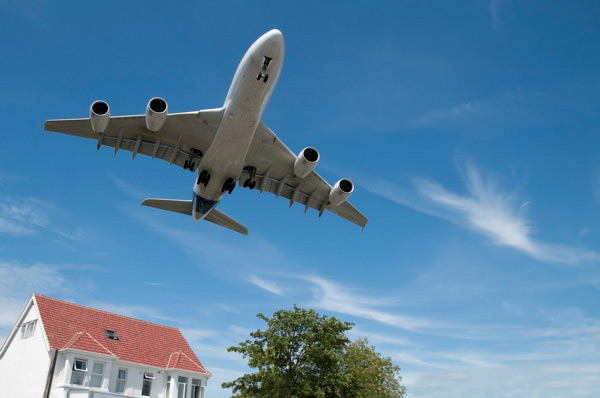Aviation Activities And The Numerous Health Hazards

By Okuneye Moyosola
People living near airports have shown concern over health effects of activities of the airport. These concerns are substantiated by MMS Plus findings which indicate that aircraft noise have adverse health effects on people, such as annoyance, sleep disturbance, and cardiovascular diseases
Airports considerably contribute to local economy and employment. However, together with the socioeconomic benefits they offer, environmental costs and impacts are the inseparable results of the operation of airports.
Following the increasing demand for air travel for passengers and cargoes, aviation industry is anticipated to grow further and this means more incentives and driving force for building new airports or expanding the existing ones, and this will intensify the significance and complexity health concerns. The aviation industry is responsible for about 2% of global manmade carbonmonoxide emissions, according to the Intergovernmental Panel on Climate Change report, Aviation and the global atmosphere.
Researchers have shown for years that the exhaust from aircraft contains ultrafine particles that are harmful to human health. These particles are hazardous to human health because they can penetrate in to the lungs and into breathing passages and worsen asthma symptoms, as well as lead to decreased lung function and impair cognitive ability in children.
Air pollution can be deadly, especially considering the toxic fumes emitted as a result of aviation operations. These toxic pollutants, emitted from airplanes flying at a cruise altitude of about 35,000 feet, contribute to an estimated 8,000 deaths per year.
Similarly, noise can also cause profound negative effects on human health and their physical, psychological and social well-being and quality of life. Since the emergence of the aviation industry, aircraft noise has been one of the most important sources of excessive noise generated by human activities. According to studies, people who are exposed to noise exceeding 60 Decibels (dB), a day have a 30% higher risk of dying from heart attacks than people only exposed to 45dB a day.
Researchers found that the risks of cardiovascular disease were greater for those living in neighborhoods with highest noise levels and closest to the airport, such as Slough and Hounslow. Around 72,000 people living in the noisiest areas had a 10 to 20 per cent greater risk than people living in the quietest areas, researchers estimated.
Another investigation carried out in the US looked at heart disease among 6 million people living close to 89 airports. More than two per cent of hospitalisations for cardiovascular diseases could be attributed to aircraft noise, the researchers from the Harvard School for Public Health and the Boston University School of Public Health said.
This figure shows that despite the economic benefits of aviation, the health hazards associated are numerous.
Recently, the leadership of the third tier of government in whose territory Murtala Muhammed International Airport is situated, the Agege local government, clamored for monetary compensation for the noise pollution from the airport.
The Executive Chairman, Agege local government, Alh. Ganiyu Kola Egunjobi, made the declaration at the 5th edition of the Lagos State House of Assembly Constituency Stakeholders’ Meeting, with the theme, “Environmental Challenges: Community Engagement to Facilitate Lasting Solutions.”
The chairman lamented on the consequence of the proximity of the council’s area to the airport and its dire health consequence to the citizens resident and even doing business in the area.
He called on managers of the three terminals, Federal Airports Authority Of Nigeria, FAAN and Bicourtney Aviation Services Limited, to provide succor for the health challenges of the citizens who were adversely affected by the economic activities transacted in the three terminal buildings.
Egunjobi said the proximity of Murtala Mohammed International Airport and the other two domestic terminals, MMA1 and MMA2 had come with mixed blessings viewed from the attendant rapid social and economic growth of the area.
He however, added that as a responsible leader sworn on oath to protect the people, the noise pollution from the aircraft on the domestic, regional and international flights making use of the runway had in no small measure, jeopardized the health of a section of the population he had sworn on oath to cherish and protect.
Residents of Ikeja who spoke to MMS Plus on the issue highlighted fears over the steady landing and taking off of the aircrafts. A young man named Remi who lives and works In Ikeja said “sometimes we are scared that these planes could crash at anytime and so we are at risk. Looking at the type of aircraft at the Lagos airport (MMA), you would have observed that these aircraft pollute the air with carbon monoxide. Also, noise pollution is another challenge that people residing around MMA are facing. Aircraft movement often creates unrest with noise and fear when residents around the airport are at home” he said.
A medical expert while speaking with MMS Plus also highlighted some of the health challenges associated with airport said, “The major health challenge for people living close to the airport is noise pollution. The leading machineries that operate in the airport especially the plane generate a lot of noise. For the normal average human being, there is a certain level of noise that we are supposed to hear. Once the ear perceives anything outside that threshold or above it, most likely we will be end up having ear damage. The ear damage will not be immediate but when you live close to an airport and you are exposed to constant loud noise for a number of years, then you are prone to it. You may not see the effect in over one month or two months but when you are exposed to it over a number of years, you find out that you are complaining of hearing loss which means your sense of hearing is not as active as it used to be”
“Secondly, some people are very sensitive to sound. So when you are exposed to loud sounds over a period of time, you tend to stress them out. For example some people need noise to read while others can’t read in a noisy place. This means some people are sensitive to noise. When you live close to the airport where you are exposed to loud noise, it increases the level of the stress hormones in their body because it’s a form of stress to them. Such people are always stressed out and don’t seem to be able to relax unless they go to a calm and quiet place. The increased level of stress hormone ends up affecting their immunity and increasing their blood pressure. Such people, when they are stressed out because of exposure to loud noise, they start suffering from hypertension which means that they have to be placed on treatment. The doctors might end up placing them on hypertension drugs not knowing that the background cause is as a result of stress. This stress is as a result of living close to a place where they are bombarded with loud noise regularly” he said.
He urged government to enforce rules and regulations which guides the purchase of lands around airport area.
“Most airports originally were situated away from town. However with development, people end up buying lands close to the airport. Lagos airport was situated out of town but development caught up with it. When I was younger and living in Enugu, Enugu airport was situated out of town, but now whenever I visit the airport, I notice that the town is moving closer to the airport. Sometimes when the government sites an airport, they also have to take laws into their hands or pass rules and regulations to make sure that people buying lands are at a reasonable distance from the airport”.
When asked about the particular amount demanded as compensation, the Senior Special Adviser on Media and strategy, Agege Local Government, Mr Rotimi Sulyman disclosed that the council could not put a figure to it.
Sulyman while speaking in exclusive chat with MMS Plus, noted that the local government made the public outcry to create awareness on the negative impacts of the airports on its environment and residents.
“We are not going to put a figure to it but if you look at it very well. The proximity of our local government in the international airport and the local airport has advantages and disadvantages. Because the airport is close to this place, businesses are booming. Hotels here have become more profitable because people who want to catch up with their flight will prefer to stay around. We cannot equally forget the ugly side of it which is because when flights want to take off or land, they come very close to the buildings and you know the implication of this. Noise pollution is a very serious issue and in developed world, there are considerations for a whole lot of things. There is what they call flight path. In that case, authorities there do discourage people living around the flight path. But in a case where they cannot avoid it, there are proposals by the International Civil Aviation Authority (ICAO) to levy airlines and ensure that they pay for what is called ‘noise tax’. The implication of noise pollution on the health of the residents of that area cannot be waved aside. We might not be able to put an exact figure to the number of people affected as a result of this because we struggle with data here in the country”.
“We all know the implication of not having good sleep which can lead to high blood pressure or heart attack. We equally know that people who live within flight paths tend to loose their hearing ability because of the noise generated by the aircraft. We cannot get an exact figure of the number of persons that have died as a result of the activities of the aircraft. However, at the same time, nobody will disagree with us that noise pollution has health implication. For that reason, we are looking at a case where the council is compensated.
He also noted that the compensation will be used to improve the health infrastructure of the local government which will also be of benefits of the residents.
This money will be invested in our health infrastructure. We will have more clinics, give our doctors better training and purchase more drugs. The residents would benefit greatly from it”.
Also reacting to the issue, General Manager, Corporate Affairs, Federal Airport Authority of Nigeria, Mrs Henrietta Yakubu disclosed that the authority is not to be blamed for the health hazards associated with the airports.
Henrietta noted that most people keep buying lands close to the airports despite been aware of the implications.
“If their houses are at the fence of the airport then there is nothing we can do about it. People are not supposed to build houses around the site. Then if they build the houses by our land then there is nothing we can do about it. That means that they are illegal occupants. There is a certain space that should be between the residential area and the airport. If you go round that place, you’ll see that houses are directly behind our fence. They build their houses there and they are blaming FAAN for noise pollution. You can’t build houses close to our fence and hold us responsible for noise pollution” she said.
Responding to this, Sulyman dismissed claims that the occupants are illegal adding that the area where the airport is situated is a residential area.
“This area is government approved residential area. As long as it’s a government approved residential area and their activities in a way is impacting negatively on the well being of these people. I think moral responsibility should prevail on issues like this. If you are saying those people in the area are illegal occupants, I disagree. Agege is not as close as Ikeja to the airport. Despite the distance, once the flight are taking off or landing, the noise pollution they generate has negative implication health of the residents. There must be a way of compensating the people through the local government”.
According to the Federal Aviation Administration, sustainable airports have three important goals: reducing environmental impact, prioritizing economic growth and generating social progress. These goals mean that airports must take measures to reduce emissions; decrease noise, light, and visual pollution; safeguard wildlife; and lower their consumption of natural resources. It is important that airports in the country are built with sustainability in mind. This would greatly reduce some of the health risk that comes with it.
Aircraft manufacturers, airport designers, engineers, and architects also need to work collectively to make aviation more sustainable by focusing on sustainable designs. Various airports and airlines around the world are making solid efforts to curb their environmental impact and take heed of the dire environmental crisis our planet continues to face. Several companies are developing electric-powered aircraft, moving towards a more sustainable aviation sector. Nigeria’s aviation sector needs to follow this trend too.








